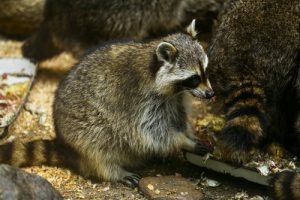Here in Florida where the climate is mild year-around compared to other parts of the country, hibernating animals are few and far between. While  there are many different animal species that hibernate for the winter all around the world, the raccoon is not one of them. Raccoons are very adaptable by nature which makes them well suited for the winter months. From changing their diets to seeking shelter, and entering a state similar to hibernation called Torpor, raccoons make plenty of changes during the winter months.
there are many different animal species that hibernate for the winter all around the world, the raccoon is not one of them. Raccoons are very adaptable by nature which makes them well suited for the winter months. From changing their diets to seeking shelter, and entering a state similar to hibernation called Torpor, raccoons make plenty of changes during the winter months.
Winter Diet
Raccoons are omnivores, and this comes in handy for them during the cold season when food is scarcer. They often get nutrients from plants, animals, eggs, insects, and human sources like food scraps and garbage cans. The ability to utilize any food course available makes it so that raccoons are always well-fed. Winter diets typically consist mainly of acorns, fruits, insects, and crippled animals – though they will always take advantage of the easily accessible dumpster or garbage can.
Increasing Fat Reserves
Similar to how a hibernating animal stocks up on food and fat stores before going to sleep, raccoons take steps against starvation by increasing their fat levels in the summer and fall months. This fat is then used to supplement what food the raccoons are able to scavenge, and they will typically lose 15-50 percent of their body weight depending on how severe the winter is. A raccoon’s fat stores are located mostly in the tail, which can help them stay warm by wrapping it around themselves.
Shelter
As temperatures drop, raccoons will actively build dens or seek out shelter to keep them warm and protected from the elements. In nature, they most often use hollow trees but will move into abandoned or occupied buildings if the opportunity arises.
Entering Torpor
Like some animals enter hibernation when winter hits, raccoons enter a state called torpor. Though not a true hibernation, a raccoon can sleep in a curled up position in their den for weeks, significantly reducing the amount of energy needed to survive. Their body temperatures drop along with their blood sugar during this time. On warmer days raccoons will then wake up to forage for food before returning to their den for more rest. This allows many of the benefits of hibernation while still allowing them to stay alert for predators.
Though other parts of the country would argue that we hardly have a winter at all here in Florida, animals like raccoons still take measures to ensure their survival during these months. Be wary of these critters seeking out areas of your home or property for protection, and if you do notice them, be sure to call a professional wildlife removal service like Critter Control® of Tampa right away. Call us today with questions, or to schedule a raccoon removal consultation.





